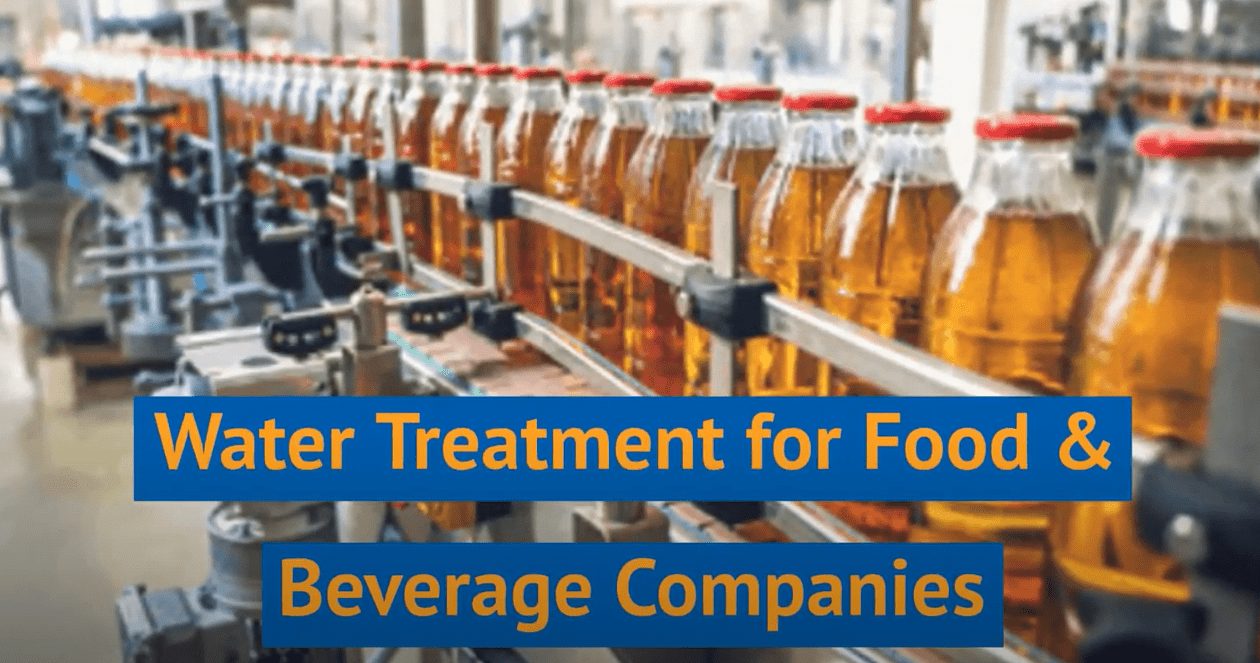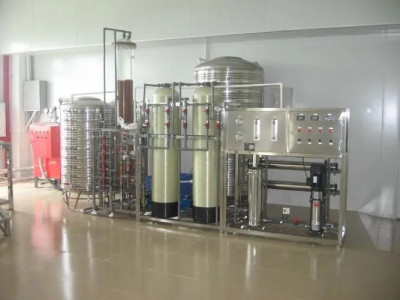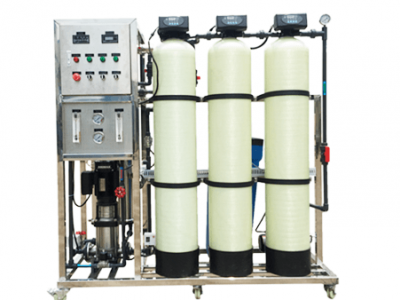Water is an essential component in the food and beverage industry, used for a wide range of applications such as cleaning, processing, and ingredient mixing. However, the quality of water required for these purposes is not always readily available. Raw water sources can contain contaminants that affect the taste, appearance, and safety of the final product. Therefore, proper water treatment processes are critical to ensure that water meets all necessary standards and regulations before it’s used in food production. In this article, we will explore the importance of water treatment in the food and beverage industry and how it impacts both product quality and consumer safety. We’ll also delve into some common methods for treating water used in food processing facilities.
May 31, 2023

Importance of Water Treatment in the Food and Beverage Industry
Water is a key component in the production of food and beverages. It is used for various purposes such as cleaning, sanitation, heating, cooling, and processing. However, if the water used is not treated properly, it can contain harmful contaminants that can affect the quality and safety of the final product.
Contaminants such as bacteria, viruses, fungi, organic and inorganic substances can be present in untreated water. These contaminants can cause spoilage of food products or even lead to foodborne illnesses when consumed. Therefore, it is crucial to treat water before using it in the food and beverage industry.
A water treatment plant is essential for this industry as it ensures that the water used meets certain quality standards. The quality of water used in beverages has a significant impact on their taste and flavor. For instance, water with high mineral content can affect the taste of beer or soft drinks.
There are several water treatment processes used by the food and beverage industry to purify water. These include filtration methods like reverse osmosis (RO), activated carbon filters, ultrafiltration (UF), microfiltration (MF), and nanofiltration (NF). The most popular technology among these methods is RO due to its efficiency in removing dissolved solids from water.
The choice of a suitable water filtration system depends on various factors such as the type of contaminants present in the source water, required flow rate, budget constraints, etc. Additionally, companies need to consider environmental sustainability while choosing their preferred method.
Implementing a water treatment system may come with some challenges such as high initial investment costs for installing equipment or maintenance expenses. Nonetheless, companies should not overlook these issues given that they may face regulatory fines for failing to comply with environmental regulations or producing unsafe products.
having an efficient water treatment system is critical for ensuring safe and high-quality food and beverage products. The utilization of advanced technologies such as RO water treatment systems can help companies achieve their production goals while adhering to environmental standards. The future trend in the water treatment for food industry is the use of innovative technologies that prioritize sustainability and profitability at the same time.
Common Contaminants in Water Used in the Food and Beverage Industry
Some common contaminants found in water used in the food and beverage industry include microorganisms, such as bacteria, viruses, and parasites. These microorganisms can cause foodborne illnesses when ingested by consumers. Chemicals like pesticides, herbicides, heavy metals like lead or mercury, and other harmful substances can contaminate water sources.
Apart from these contaminants, there are also natural impurities like sediments, dissolved minerals, and other particles that affect the taste of beverages like coffee or tea. Besides altering the taste of beverages, these impurities can clog pipes or equipment leading to reduced efficiency or breakdowns.
To prevent contamination of products produced by companies within this sector it is important to invest in a suitable system to ensure reliable access to clean water. Some popular water treatment technologies utilized by the food and beverage industry include reverse osmosis (RO), deionization (DI), ultraviolet (UV) systems, among others.
RO water treatment systems are particularly effective at removing a wide range of contaminants from water including sediments, dissolved solids such as salts or minerals that may alter the flavor profile of your end product.
it is essential to consider treating process water within your plant using appropriate technology; this helps ensure high-quality standards while preventing contamination issues which could lead to costly recalls or brand reputation damage resulting from contaminated products reaching supply chains.
Water Treatment Processes for the Food and Beverage Industry
water from natural sources contains several contaminants that need to be removed before it can be used for consumption or production processes. The quality of water used in beverages affects their taste, appearance, and shelf life. Therefore, it is vital to treat water to meet regulatory requirements and industrial standards.
There are different types of water treatment processes that can be used in the food and beverage industry. Each process has its advantages and disadvantages depending on the specific application. The following are some of the most common water treatment processes used in this industry:
Reverse Osmosis (RO)
Reverse osmosis is a popular water filtration system used in the food and beverage industry because it effectively removes impurities from water. RO systems work by forcing water molecules through a semi-permeable membrane that traps contaminants such as bacteria, viruses, salts, and minerals. RO systems are highly efficient at producing high-quality treated water suitable for various applications.
Ultrafiltration (UF)
Ultrafiltration is another water treatment technology that uses membranes to remove impurities from water. UF membranes have larger pores compared to RO membranes, allowing them to remove larger particles such as colloids, proteins, and some bacteria. UF systems are commonly used for pre-treatment before other treatment processes or as a standalone method for producing potable water.
Activated Carbon Filtration
Activated carbon filtration is an effective method of removing organic compounds such as chlorine, pesticides, herbicides, and other chemicals from water. Activated carbon filters work by adsorbing contaminants onto their surface area through physical or chemical bonding.
Ozonation
Ozonation is a chemical oxidation process that uses ozone gas to disinfect and purify water. Ozone gas reacts with organic compounds present in water to produce oxidized by-products that are easily removed from water. Ozonation is a highly effective method of removing bacteria, viruses, and other pathogens from water.
Chlorination
Chlorination is a widely used disinfection method in the food and beverage industry. It involves adding chlorine gas or hypochlorite to water to kill bacteria and viruses. Chlorine also helps to remove unpleasant tastes and odors from water.
When selecting a suitable water treatment plant for the food and beverage industry, several factors need to be considered. These factors include the quality of the source water, regulatory requirements, production needs, and budget constraints. The chosen treatment process should be efficient, reliable, cost-effective, and capable of producing high-quality treated water.
Implementing a water treatment system in the food and beverage industry can face several challenges such as high capital costs, maintenance costs, regulatory compliance issues, and lack of technical expertise. However, these challenges can be overcome by working with experienced engineers who understand the specific requirements of this industry.
There are different types of water treatment processes available for this industry depending on specific applications. Reverse osmosis systems are popular due to their effectiveness in removing impurities from water while ultrafiltration systems are commonly used for pre-treatment before other processes. Activated carbon filtration removes organic compounds while ozonation disinfects and purifies water effectively. Chlorination remains an essential disinfection method in the food and beverage industry.
Advantages of Reverse Osmosis (RO) Water Treatment Systems for the Food and Beverage Industry
Reverse osmosis (RO) is a water treatment technology that uses a semi-permeable membrane to remove ions, molecules, and larger particles from water. RO systems are widely used in the food and beverage industry due to their efficiency in removing contaminants, such as bacteria, viruses, minerals, and chemicals from water.
Here are some advantages of using RO water treatment systems:
High Purity Water: RO systems can produce high purity water with low levels of contaminants. This is important in the food and beverage industry as it ensures that products are safe for consumption and meet regulatory standards.
Cost-Effective: RO systems are cost-effective compared to other water treatment methods because they require minimal maintenance and have low operating costs.
Environmentally Friendly: RO systems do not use chemicals or produce wastewater, making them environmentally friendly.
Versatile: RO systems can be used for various applications in the food and beverage industry such as ingredient water, process water, boiler feedwater, cooling tower makeup water, and wastewater treatment.
Easy Installation: RO systems are easy to install and can be customized to fit specific needs.
Improved Taste: Removing impurities from water can improve the taste of final products such as drinks, soups, sauces, and other food items.
using an RO system for water treatment in the food and beverage industry has numerous benefits including cost-effectiveness, versatility, high-purity water production capabilities and environmental friendliness which make it a popular choice among businesses.
Factors to Consider When Choosing a Suitable Water Treatment
When it comes to water treatment in the food and beverage industry, choosing the right system is crucial. A lot of factors need to be considered before selecting a suitable water treatment system for the industry. Here are some key factors that should be taken into account:
Water Quality
The quality of water used in the food and beverage industry is of utmost importance. The taste, odor, and appearance of the final product can be affected by the quality of water used during production. Therefore, it is important to analyze the water quality before selecting a water treatment system. This will help determine which contaminants need to be removed from the water.
Cost
Cost is always an important factor when making any business decision, and choosing a water treatment system is no exception. It is essential to consider both initial costs and long-term operating costs when selecting a system. For instance, reverse osmosis (RO) water treatment systems tend to have higher initial costs compared to other systems like UV disinfection systems or activated carbon filters.
Maintenance Requirements
All water filtration systems for the food industry require maintenance, but some require more than others. It’s important to consider maintenance requirements when choosing a system because this can affect downtime during maintenance periods. Some systems like RO require regular membrane replacement, while UV disinfection systems require regular lamp replacement.
Regulatory Compliance
Regulatory compliance is another critical factor when selecting a water treatment system for the food and beverage industry. The regulations governing water quality in this sector are stringent, so selecting a system that meets these standards is essential.
Performance
The performance of any water treatment plant in beverage industry or food processing facility should not be overlooked when choosing a suitable system. The chosen system should meet all necessary performance requirements such as flow rate and contaminant removal efficiency.
These factors include water quality, cost, maintenance requirements, regulatory compliance, and performance. By taking these factors into account, companies can choose the best system for their specific needs and ensure that they are providing high-quality products to their consumers.
Challenges Faced During the Implementation of a Water Treatment
The implementation of a water treatment system in the food and beverage industry can be quite challenging. One of the primary challenges is the cost of installing and maintaining such systems. The quality of water used in beverages or in food production is crucial, but it comes at a high cost.
Another challenge faced during the installation process is finding space for the water treatment plant. Most food and beverage processing plants are already set up with limited space, so finding an adequate area for a water treatment plant can be difficult.
Additionally, finding skilled personnel to operate and maintain these systems can also be challenging. It requires specialized knowledge to ensure that the water filtration system for food industry operates efficiently and produces high-quality water.
Furthermore, regulatory compliance can pose significant challenges as well. Regulations governing water quality differ from state to state, which makes it essential to fully understand all local regulations before implementing any new water treatment plan in a facility.
Despite these challenges, implementing a water treatment plant in beverage industry or any food processing industry has several advantages that outweigh the obstacles faced during implementation. These advantages include improved product quality, increased production efficiency, and reduced operating costs in the long run.
Future Trends in Water Treatment for the Food and Beverage Industry
The food and beverage industry is constantly evolving, and so are the water treatment technologies used to ensure the quality of water. There are several emerging trends in water treatment for the food and beverage industry that are expected to gain popularity in the future.
One of these trends is the use of reverse osmosis (RO) water treatment systems. RO systems have been around for a while, but they are becoming more popular as they become more affordable. RO systems work by using pressure to push water through a semi-permeable membrane to remove impurities and contaminants. This process is efficient in removing dissolved solids, bacteria, viruses, and other contaminants from the water.
Another trend is the use of water filtration system for food industry that uses ultraviolet (UV) light technology. UV light technology works by using high-intensity UV lamps to disinfect water by killing bacteria, viruses, and other pathogens without adding any chemicals or changing the taste or smell of the water. The advantage of this technology over traditional chemical treatments is that it doesn’t leave any harmful residues.
A third trend is the use of innovative hybrid technologies that combine two or more different water treatment plant in beverage industry processes such as carbon filtration with UV light technology or RO with electro-deionization (EDI). These hybrid technologies provide improved efficiency in treating challenging waters like those having high levels of hardness or total dissolved solids.
In addition to these technological advancements, there will also be an increased focus on sustainability and environmentally friendly practices when it comes to water treatment for food industry. Companies will look for ways to reduce their carbon footprint by implementing energy-efficient processes like solar-powered desalination plants or using waste heat from industrial processes to power their water treatment facilities.
As new technologies emerge and become more accessible, companies will face the challenge of choosing a suitable solution that best meets their needs. Factors such as cost, complexity, and effectiveness will play a significant role in determining which quality of water used in beverages technology to implement.
the future of water treatment in food industry and water treatment in beverage industry is promising with the emergence of new technologies that offer better efficiency, sustainability, and affordability. As the industry continues to grow and evolve, companies must keep up with these trends by adopting innovative solutions that provide high-quality water while minimizing their impact on the environment.
The safety and quality of the products depend on the quality of water used during production. It is essential to identify and remove common contaminants found in water, such as bacteria, viruses, and chemicals, to prevent contamination of products and ensure consumer safety.
Various water treatment processes are available for the food and beverage industry. These processes include filtration, disinfection, reverse osmosis, carbon adsorption, and ion exchange. Each technology has its advantages and disadvantages that must be considered before selecting a suitable option.
When choosing a suitable water treatment option for the food and beverage industry, factors such as cost-effectiveness, efficiency, scalability, maintenance requirements, and environmental impact should be considered.
Implementation of a water treatment system can be challenging due to factors such as high capital costs, operational complexity, inadequate technical expertise or workforce training. However, proper planning and execution can help overcome these challenges.
Future trends in water treatment for the food and beverage industry are focused on sustainable solutions that use fewer resources while producing better results. Advancements in technology will enable faster processing times with even more efficient systems that produce high-quality water safe for consumption.
effective water treatment is an essential component of ensuring product quality and safety in the food and beverage industry. Companies should invest in cutting-edge technologies to provide clean drinking water for consumers while reducing their environmental footprint through sustainable practices.
How to Choose the Right Pure Water Treatment Equipment for Your Needs?
November 10, 2025
How to Choose the Right Pure Water Treatment Equipment for Your Needs? (by ROAGUA – Professional Water Treatment Equipment Manufacturer, China)
Turn Muddy Water into Clean Water: ROAGUA Stainless Steel Ultrafiltration Water Purifier for Africa
November 5, 2025
Clean Water for Every Village – ROAGUA Stainless Steel Ultrafiltration Water Purifier Built for Africa’s Tough Water Conditions
How Do You Select the Right 500LPH RO System?
October 14, 2025
buy right 500LPH RO System, please read this one first



